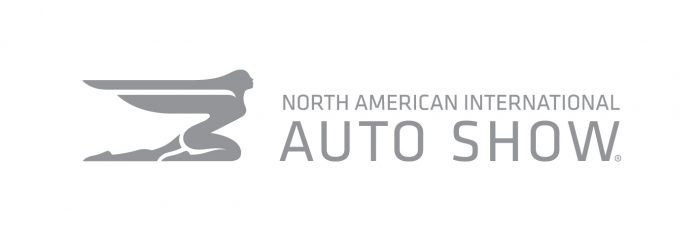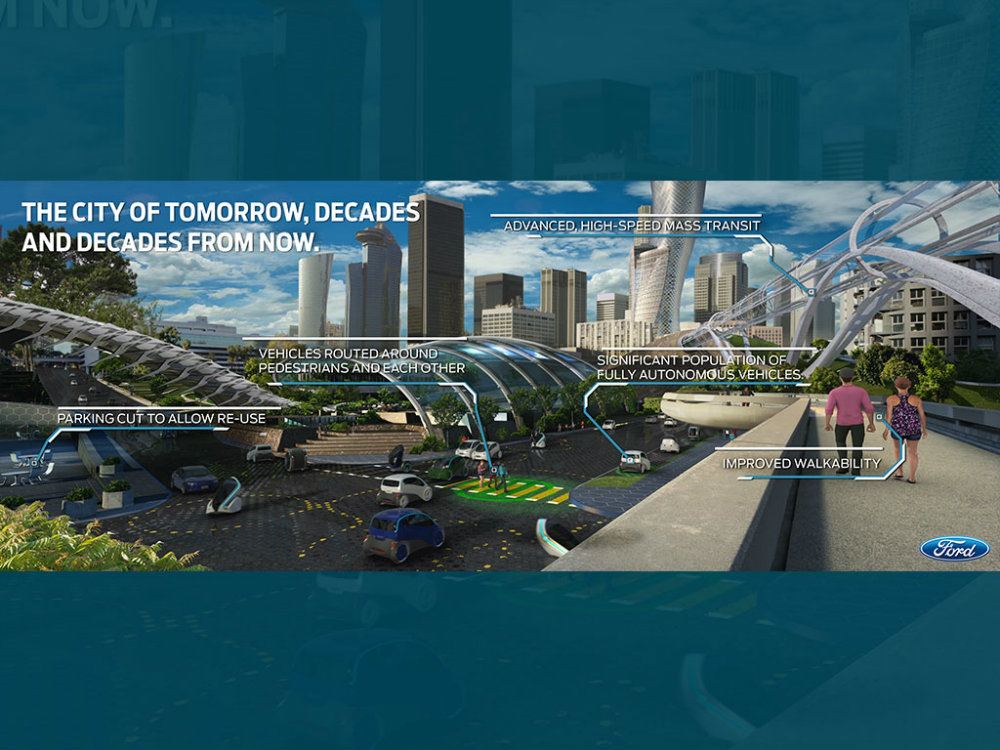Ford Motor Company made significant announcements regarding their vehicles and the future of mobility this week at the North American International Auto Show. The automaker showcased their new, 2018 F-150, confirmed the Ranger and Bronco will return, revealed an expansion of their Chariot ride-sharing service, and presented a dynamic vision for the “City of Tomorrow.”
“This year, the expansion of our business as an auto and mobility company moves into even higher gear,” said Mark Fields, President and CEO, Ford Motor Company.
Fields underscored the significance of Ford’s recent investment of $4.5 billion in the next five years to their vehicle line and to the future of mobility.
“We’re introducing even more new vehicles and technologies to make life better for millions of people in the near term, plus we’re presenting a vision and partnering with cities to move more people even more efficiently in the future,” he said.
Electrified & Autonomous Designs
Part of the aforementioned investment is targeted towards 23 new electric vehicles, including hybrid versions of the F-150 and Mustang, two pursuit-rated hybrid police vehicles, a Transit Custom plug-in hybrid, and a fully electric small SUV with an estimated range of at least 300 miles. Other plans include a high-volume, fully autonomous SAE level 4-capable vehicle. It will be complete with – or incomplete with we might say – but, the vehicle will have no steering wheel, gas, or brake pedal.
It’s expected to be in commercial operation by 2021 as a ride-sharing type vehicle.
Within the next five years, Ford expects autonomous vehicles will be introduced in cities around the world. The automaker is also predicting global EV offerings will eventually outnumber gasoline-powered ones in the next 15 years.
Ride Sharing Surge
These days, it’s not uncommon for us to have a ride-sharing app on our phone. Ford’s app-based, crowd-sourced ride sharing service Chariot is expanding rapidly. Chariot, which currently operates in San Francisco, California and Austin, Texas, is adding eight cities in 2017, including at least one outside of the United States.
Ranger & Bronco
While there were dozens of rumors flying about, nothing was confirmed until this week. Ford is indeed bringing the Ranger back to North America for 2019. The Bronco follows in 2020 and will be available globally. Both vehicles will be manufactured at Ford’s Michigan Assembly Plant in Wayne, Michigan.
“We’ve heard our customers loud and clear. They want a new generation of vehicles that are incredibly capable yet fun to drive,” said Joe Hinrichs, Ford’s President of The Americas.
The success of the Chevrolet Colorado and Honda Ridgeline proved the midsize truck market is alive and well, and ripe for the taking. Although a Ranger/Bronco combo were merely rumors up until this week, it would be hard to imagine Ford giving up any ground here against competitors. Sooner or later, we expected this announcement, given the demand for midsize trucks and SUVs.
“Ranger is for truck buyers who want an affordable, functional, rugged, and maneuverable pickup that’s Built Ford Tough,” Hinrichs said. “Bronco will be a no-compromise midsize 4×4 utility for thrill seekers who want to venture way beyond the city.”
City of Tomorrow
Beyond building vehicles, Ford wants to optimize the infrastructure of our urban homes, and directly address the growing changes and challenges when it comes to mobility. Ford’s City Solutions Team is the first of its kind in the automotive industry, working with the world’s major cites to tackle everything from gridlock to air pollution.
Bill Ford, Executive Chairman of Ford Motor Company, is particularly passionate about the topic.
“This is an issue that goes far beyond congestion. It is one that represents a massive challenge to mankind, one that affects our well-being and access to health care, clean drinking water, food, a safe place to live, and even the ability to find work,” he said.
Ford’s City of Tomorrow looks at how near-term mobility advancements like autonomous and electric vehicles, ride-sharing and ride-hailing, and other connected vehicles interact with urban infrastructure. The entire “transportation ecosystem,” if you will, is examined, and most of the vehicles included in that ecosystem are autonomous and electrified.
Ford envisions a world where drones play a critical role as well. For example, they could be quickly deployed to survey and map the hardest-hit areas following earthquakes, tsunamis, or other major disasters. Meanwhile, data from all aspects of the ecosystem could be gathered on vehicles, bikes, mass transit, street lights, parking meters, and charging infrastructure to quickly access a multitude of situations.
Elsewhere in the City of Tomorrow, reconfigurable roads can respond to commuter needs and traffic flow. Other solutions include eliminating traffic jams, reducing emissions, and bringing accidents and collisions to record low levels. Road space is even saved in favor of greener landscapes like parks and recreation areas.
It’s a brave new world, not without it’s challenges, yes, but certinately possible.
“By solving the mobility challenge, we have the chance to create a better world for future generations. It’s both an exciting opportunity and a big responsibility,” Ford said.
Carl Anthony is Managing Editor of Automoblog and resides in Detroit, Michigan.
Photos & Source: Ford Motor Company.
http://www.automoblog.net/2017/01/10/ford-introduces-city-of-tomorrow-as-ranger-bronco-return/


No comments:
Post a Comment